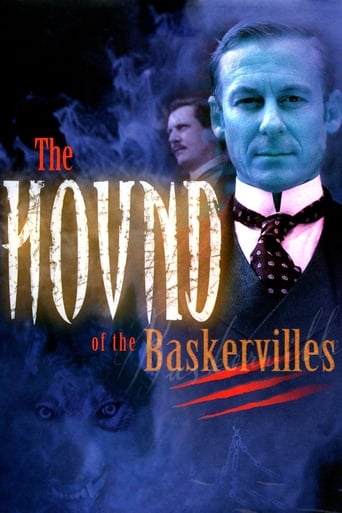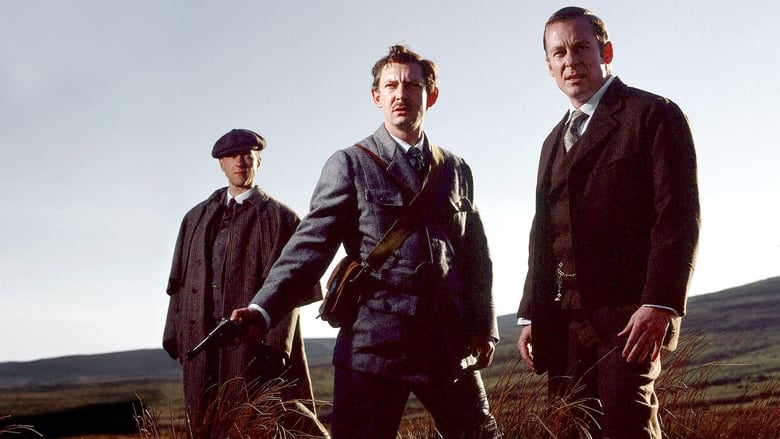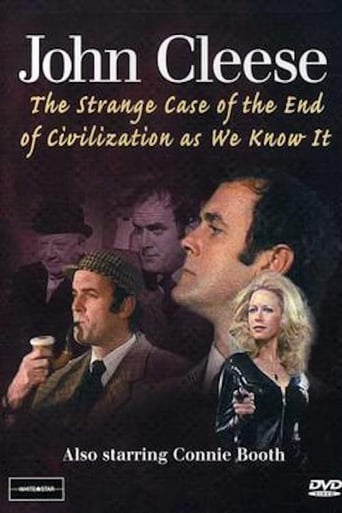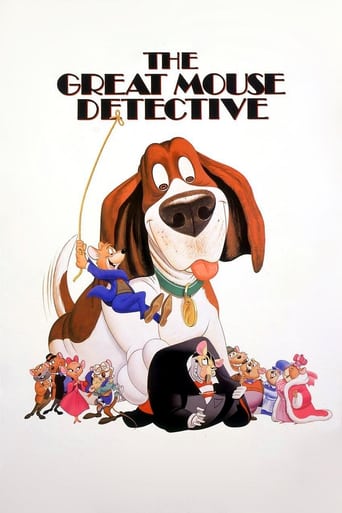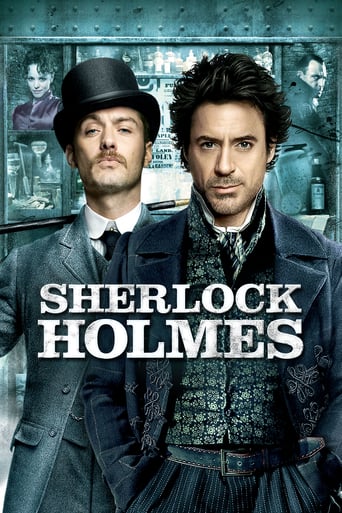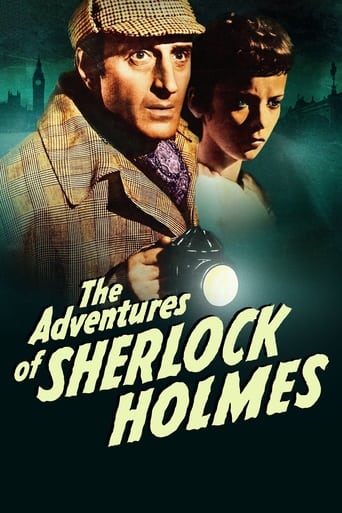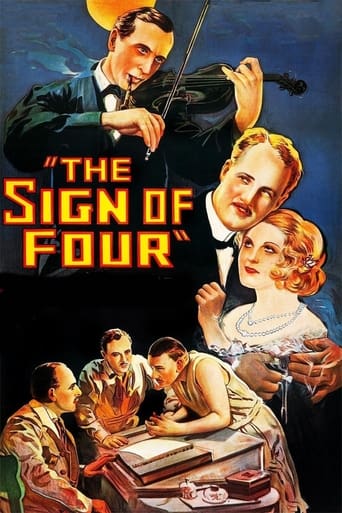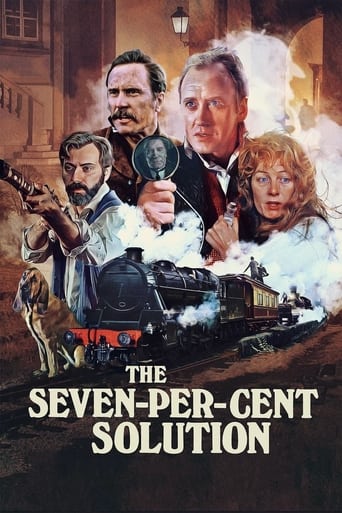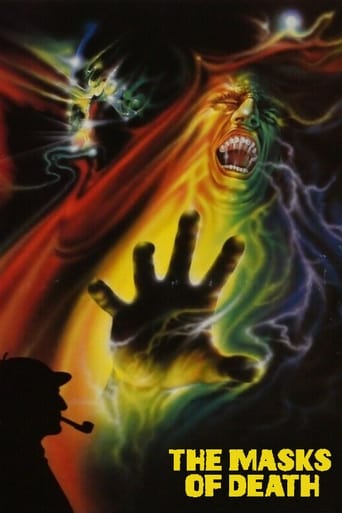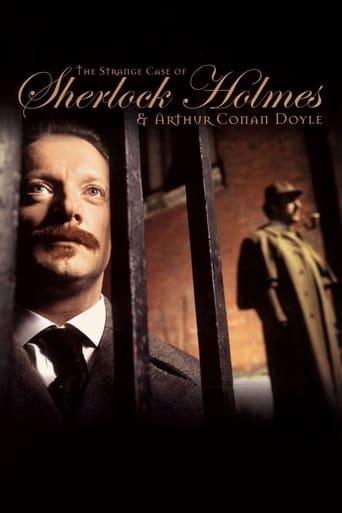The Hound of the Baskervilles (2002)
Sherlock Holmes and Dr. Watson are called in to unravel a mysterious curse that has plagued the Baskerville family for generations. When Sir Charles Baskerville is found dead, his heir, Sir Henry, begs Holmes to save him from the terrifying supernatural hound that has brought fear and death to his household.
Watch Trailer
Cast
Similar titles
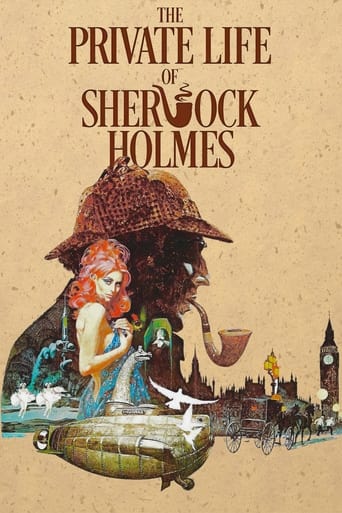
Reviews
People are voting emotionally.
It's fun, it's light, [but] it has a hard time when its tries to get heavy.
One of the most extraordinary films you will see this year. Take that as you want.
It is a whirlwind of delight --- attractive actors, stunning couture, spectacular sets and outrageous parties.
Am a huge fan of Sherlock Holmes and get a lot of enjoyment out of Arthur Conan Doyle's stories. 'The Hound of the Baskervilles' is one of the, perhaps even THE, most famous Sherlock Holmes stories and is the most adapted. For good reason, it is such a thrilling and scary story and contains a tantalising mystery.This 2002 adaptation could have been better and is not in the same league as those of Jeremy Brett, Basil Rathbone and Peter Cushing, all wonderful and with vastly superior interpretations of Holmes. While one of the lesser adaptations of 'The Hound of the Baskervilles', it's not the worst. It is better than the Matt Frewer film and although it needs to be re-watched remember the Peter Cook film being an abomination (from personal experience, while there have been a fair share of changes most of my re-watches have seen my opinions unchanged).Certainly there are plus points. On the most part, 'The Hound of the Baskervilles' looks great. There is a real creepiness and authenticity to the settings and production design and the costumes show a careful eye for detail. It's beautifully photographed. The music is suitably eerie.Writing intrigues and entertains, while there are some genuinely creepy and suspenseful moments. Especially the opening and the attack on Seldon, as well as some of the build ups. It's paced in a lively fashion while still having some breathing space. Direction is competent enough at some points but low key in others.Of the acting, the standouts are Ian Hart's loyal Watson (to me one of the best, most interesting and most faithful interpretations) and Richard E. Grant's skin crawling Stapleton (have only seen him creepier in the 'Trial and Retribution' episode he featured in). John Nettles is also splendid, and Danny Webb fares decently as Lestrade. Really liked Holmes and Watson's loyal yet strained chemistry and Watson featuring heavily in the second half which made him more interesting.Was more conflicted though on Richard Roxburgh. Didn't mind the lack of physical resemblance, for me he did a serviceable enough job and has some charisma but he is also a bit bland and pales in comparison to very stiff competition, particularly Brett and Rathbone. Holmes could have been written somewhat better too, much has been said about the over-emphasised and out of character drug use (he did them, but not how depicted here) and his deductions seemed too convenient and telegraphed somehow.Matt Day to me was a dull Sir Henry and Neve McKintosh, while lovely, seemed too modern for the period and the character is gratuitously treated here.Also felt there were dull stretches, with the party and séance sequences feeling like padding. The hound effects are really quite dreadful, looking like something out of the 50s or earlier except worse looking, the culprit is obvious far too early (even for those familiar with the story or knows it inside out) and the ending is confused, rushed and anti-climactic, as well as missing the point of the ending, story and title. In summary, not bad but could have been better. 6/10 Bethany Cox
Sherlock Holmes (Richard Roxborough) and his aide Watson (Ian Hart) are engaged to investigate the bizarre death of Sir Charles Baskerville, the latest victim of his family's horrible 'curse'. Watching over the last in the family's line, Sir Henry (Matt Day), Holmes ventures onto the forbidding Dartmoor moors to investigate the demon hound.Before Cumberbatch and Moffat, the BBC tried to reinvigorate Holmes with this 2002 TV film, amping up the action, atmosphere and body horror of Conan Doyle's most famous novel, and with mixed results. Right out of the gate, the film's first problem lies in its lead: Roxborough, while not terrible, doesn't make for a terribly distinct Holmes. He doesn't exude intelligence, mania, authority or a sense of control like many other interpretations have, and as a result does deflate the proceedings, never fully commanding the scenes the way a Holmes actor ought to.The second issue is a confused mission statement: the screenplay mostly condenses Doyle's story well, and straddles the line of the supernatural very well, if not enhances the whole contrast further with a well handled a séance sequence, but adds a few things. Turning more low key elements like an interrogation of a cabbie into little action scenes, as well as changing bits of structure and characterization from the various cast, would likely annoy purists, but then throwing things in like Holmes' drug addiction (which honestly is never properly explained in the context of this film) really only makes sense to those already familiar with the books, so just who is the film made for? And the third is the actual Hound which, while in terms of design is actually fairly effective, a nightmarish hyena-dog-tiger hybrid, the CG even in '02 leaves much to be desired, and comes off as a tad rubbery and not meshed well with the environment.All these issues do knock down what is otherwise a fairly decent mystery thriller: the cast are good with Richard E. Grant chewing scenery as the devilish Stapleton, and director David Attwood does a good job at creating an uneasy and haunting atmosphere on the moors, keeping the Hound as a background menace, building up to it slowly while it howls in the fog. However, such details do not deter the facts of the case: this Hound never rises higher than being, purely and undeniably, elementary.
In this new adaptation of Conan Doyle classic book, Sherlock Holmes (Richard Roxburgh, "Moulin Rouge") and Dr. Watson (Ian Hart, "Harry Potter and the sorcerer's stone") investigate the mysterious death of sir Charles Baskerville, whose body was found in the moor surrounding his antique manor."The hound of Baskerville" is probably the most well-known Sherlock Holmes adventure and as such as been adapted many times (IMDB references no less then 19 versions). Yet, this fine BBC production proves that there is still something new to say about this story and ranks as one of the best adaptation.First, it got the story right. Despite the presence of Sherlock Holmes and the rational ending, "the hound of the Baskerville" is more a Gothic horror tale then a police procedural. And this is how the story is approached in this movie. The dark and moody set (the mist-covered moor, the sinister Baskerville hall) creates a great Gothic atmosphere which fits well with the occasional use of gore. The plot follows quite closely the one of the book except for one or two welcome additions (the Christmas party notably, as the the movie was produced as a BBC Christmas special), which helps keep the pace of the movie fast and engaging.The other strong point of this production is the original portrayal of Holmes and Watson and of their relationship. Both are depicted as much younger and more physical then in previous version. Neither the heroic figure portrayed by Basil Rathbone nor the neurotic outsider portrayed by Jeremy Brett, Holmes is conceived as a risk-seeker. This leads him to make mistakes of judgment, his recklessness putting both his client, Watson and himself in danger, and his selfishness alienating Watson for whom he has nonetheless a deep rooted affection as witnessed by his reaction when Watson is shot or the final scene where Holmes, surprisingly, apologizes to Watson for his behavior and seems genuinely concern he might have reached a point of no return in his relationship with his friend. In this context, the controversial decision to make Holmes a genuine cocaine addict make good psychological sense. In the books, Holmes was taking drugs only when he was not on a case, to stimulate his brain. Here, on the contrary, he takes the drug at moment where he seems to be the most stimulated (at the onset of the case, and, more shockingly, in a toilet of a restaurant while Lestrade and Watson are waiting for him to arrest the murderer).Overall, although still an intellectual genius, this Holmes is less of a superhero apart from humanity, and more of a flawed human being. This is reinforced, probably unintentionally, by the fact that Richard Roxburgh lacks the charisma and the intensity previous actors (notably Basil Rathbone, Peter Cushing and Jeremy Brett) have brought to the role. This would have been a major flaw in any other Sherlock Holmes movie but not in this one, given its peculiar approach of the character.Portrayals of Watson have come a long way since Nigel Bruce depicted him as an idiot in the Basil Rathbone movie. Watson is now portrayed like he actually is in the Conan Doyle story, as a warmth and kind man, having many of the human qualities that Holmes lacks. But in this version, Watson, superbly played by Ian Hart and who, given his screen exposure, is actually the real main protagonist of the story, is even more competent then usual, proving himself a very efficient detective in his own right and a man of action. He is also given a much darker edge then usual. In the books, Holmes often treats Watson in a way that could be considered rude or manipulative. Interestingly, this movie takes a realistic look at how Watson would reacted to it, as he is shown as deeply hurt by Holmes' behavior. "I don't trust you", he tells him and even, during a dinner at Baskerville Hall, perhaps expressing his resentment for his friend, mocks him.This is a much strained friendship then the one usually depicted. It is also a more realistic one, given Holmes' peculiar behavior. It gives the impression to see the real Holmes-Watson relationship, before Watson watered it down for his reader (interestingly, this fits also with Holmes' cocaine addiction. Had Holmes existed, rumors of his cocaine addiction would have spread that Watson would have tried to brush away by inventing the myth the Holmes was not using the drug in a recreational way but only when a case could not provide the amount of intellectual stimulation he needed).Hence, all in all, because of his engaging plot, atmospheric settings, superb production value and of its original take on two characters of whom everything seemed to have been said (notably after their definitive interpretation given in the Jeremy Brett series), the latest version of "the hound of the Baskerville" is a must-see for any Sherlock Holmes aficionados.
Film students, gather around.One of the best things in films to study is how different chapters of a franchise change as different artists become involved. Batman, Alien, even goobers like Halloween. Just as interesting is to compare different approaches to films that respect their material. Film versions of Hamlet for instance. There's a terrific example with "Eat Drink Man Woman" and a new carbon copy "Tortilla Soup."Different editions of Holmes are illustrative because they really are different, radically so. And the "Hounds" seem to denote the greatest swings.This is probably the least attentive to the written story that I know. An important pair of characters is omitted, greatly changing the mystery. The wonder about the supernatural is toned down. They added a séance, but took away the soul of the thing which was an overwhelming evidence of the supernatural untangled as the intertwined logic of three murderers.(In the original story, the beast was an ordinary large dog with florescent paint. Here, the beast really is something a bit alien.)So what started as a grand battle between logic and superstition, which had grand deceptions and counterdeceptions confounded by accident, which had a master, THE master involved.Alas, the master here is actually secondary to Watson who pulls HIM out of the muck. Its a complete turnaround from the Rathbone Holmes who pulled his comic Watson from identical muck.The overall effect is bland. There's no moody atmosphere, no champion, no deduction, no logic. There's no lust as in the original. One wonders why anyone would watch this at all except to fill time. Unless, unless you are trying to discover why film works and what discovered narrative is all about.Ted's Evaluation -- 1 of 3: You can find something better to do with this part of your life.
